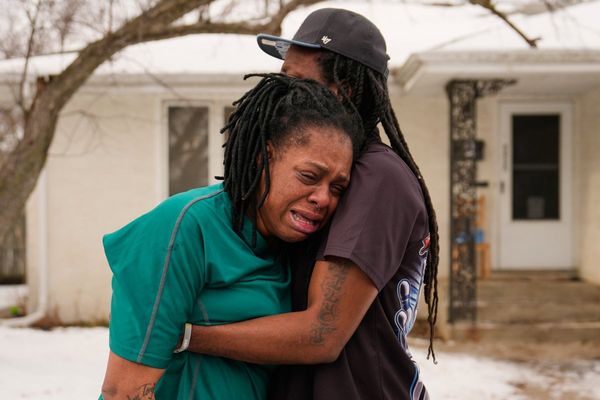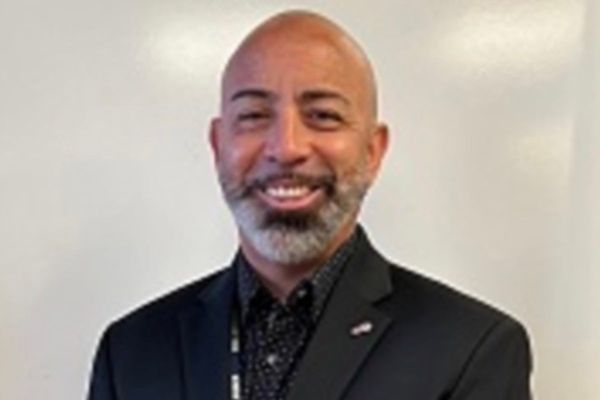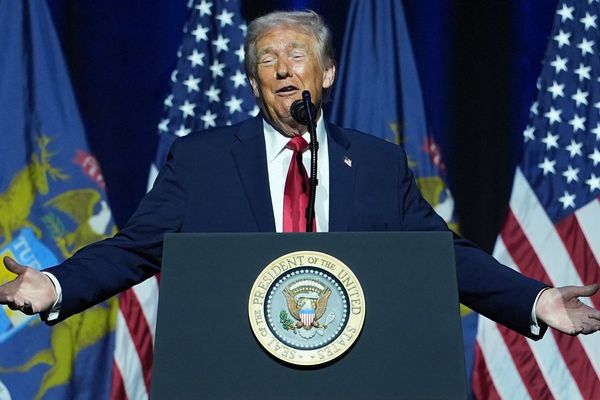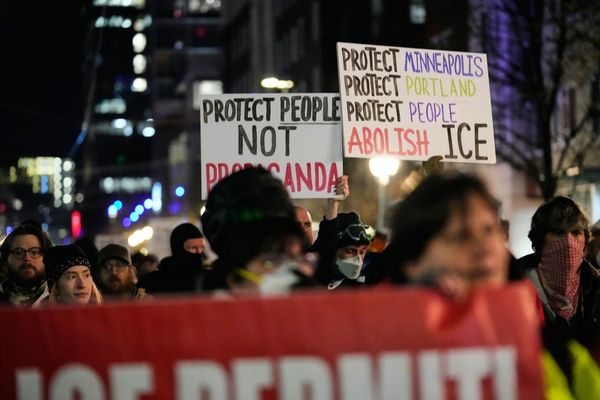
In a small car park in the Russian-occupied city of Kherson, there was a smattering of applause last week as Anton Alikhanov cut a red ribbon to mark the ceremonial opening of a local television station, Tavriya TV.
The new channel is part of a propaganda drive in Kherson that Russia hopes will help cement its hold over the southern Ukrainian city, occupied in the first days of the invasion. Alikhanov, the governor of Russia’s Kaliningrad region, said journalists from his city would come to Kherson to “help” the new channel find the right message. The Kremlin has appointed various Russian regions to “curate” different parts of occupied Ukraine.
Kyrylo Stremousov, the deputy head of Kherson’s Russian occupation authorities, made no secret of the channel’s mission: “Tavriya will now start work, as one big machine that will not just do propaganda, but will also promote family, goodness, happiness and love, of course together with big, united Russia.”
In the towns near Kyiv that were occupied in the spring, Russian rule was a time of terror when even stepping outside was dangerous for residents. In Kherson, too, there are credible reports of kidnappings, arrests and torture. But here, there is another side to Russian rule. The Kremlin is attempting to portray a happy, prosperous future inside Russia as it gears up to hold a “referendum” to annex Kherson and three other Ukrainian regions.
In telephone interviews, residents of Kherson described an ominous atmosphere in the city’s deserted streets as much of the population has fled and those who remain are scared to talk freely and worry about what the coming months with bring.

But on television, residents can watch a through-the-looking-glass version of their own reality, in which the population has joyously welcomed Russian rule. In the new media world Russia has created in Kherson, Moscow is not an invading force, but a benevolent liberator, bringing economic plenty and cultural renaissance to Kherson and saving its citizens from Ukrainian Nazis.
“When I watch the television news or I open the pro-Russian Telegram channels, it feels like I’ve stepped into some kind of completely alternative reality,” said one Kherson resident in his 30s, who asked not to be named.
Until Tavriya gets up and running, the main local channel in Kherson is VTV Plus, which has functioned for more than a decade. In late February, just before the Russian occupation, VTV broadcasts were in Ukrainian, and included interviews with locals who had joined territorial defence and armed neighbourhood watch brigades, who spoke of defending their territory against the Russians.
In the weeks after the occupation, VTV attempted to remain neutral, showing interviews with the Ukrainian mayor, Ihor Kolykhaiev, who stayed in the city and continued working even after the Russians took over. During this time, there were a series of pro-Ukrainian rallies in Kherson, with unarmed protesters facing down Russian soldiers.
But the Russians soon began a crackdown on dissent, and the television station was no exception. The owners of VTV were long known to be sympathetic towards Russia, but a VTV employee, who remains in Kherson, said the majority of journalists there resigned soon after the Russian occupation.
She said: “Those who stayed are mostly the ones without much experience. Some journalists from Crimea and St Petersburg have come, and they are now in charge.”
By the start of the summer, the broadcasts had switched to Russian language, and the tone had become wholeheartedly pro-Russia. There was a focus on telling residents that resistance to Russian rule was futile.
One June news bulletin featured a 19-year-old named only as “Ivan”, saying he was a Ukrainian army conscript but had come to give himself up because his mother had advised him to. He mumbled his details to a Russian army officer.
Shortly after, the channel aired an item in which four purported members of the pro-Ukrainian territorial defence of Kherson came to surrender, claiming they felt abandoned by Ukraine. “It’s time to stop these partisan games,” said one of the men, who at one point appeared to be crying. He was one of numerous VTV interviewees to look visibly uncomfortable and nervous as they claimed on camera to be happy about Russia arriving.
While there is widespread coercion, it is also clear that a minority of residents have eagerly cooperated with Russian rule. Some are pensioners, nostalgic for their youth, who see Moscow’s rule as a return to the Soviet past.
Others are careerists, who see opportunities as the Kremlin struggles to find local people to fill key posts. These include the region’s deputy governor Stremousov, previously an anti-vaccine blogger and political marginal who garnered 1.5% of the vote in the 2020 mayoral elections.
Stremousov now appears almost daily on the news, particularly after the Kremlin-appointed local governor, Volodymyr Saldo, was taken to hospital amid a suspected poisoning earlier in the summer.
However, it is clear many people are cooperating because they feel they have no choice. The VTV employee whom the Guardian spoke to said she had stayed in Kherson for family reasons, and needed to keep working to have an income. “I don’t really like working here any more, the city is completely changed, but what can I do? I just work slowly so few things really get done.”
Olena Vanina, the Kherson correspondent for Ukrainian channel 1+1, said in the weeks after the occupation, she made reports using a mobile phone to keep a low profile. “But after a while, people got too scared to show their faces, and nobody wanted to be filmed,” she said. She left the city in June, like many other Ukrainian journalists.
To fill the gap, Russia has set up a “media school” in the city, promising speedy training to anyone who is interested.
“A number of journalists fled the region because they fell under the influence of Ukrainian propaganda that told them they would be killed, tortured and raped. Others are still too scared to come to work,” said Aleksandr Malkevich, the St Petersburg-based journalist and television producer who is running the school, in a telephone interview.
In a local television piece about the school, Malkevich, who is on a US sanctions list, said people with no journalism experience are welcome to join and be trained.
As well as taking over the local channel, Russia has also blocked the reception of Ukrainian national channels, and replaced them with Russian television, where the war in Ukraine is not called a war, but a “special military operation”.
In late May, Russian authorities rerouted Kherson’s internet traffic through servers in Russia, occupied Crimea and Donetsk. Now, access to all Ukrainian domains are blocked without use of a VPN, ensuring Moscow has total control over what information about the war people receive.
Authorities have also resurrected the Soviet-era newspaper Naddnepryanskaya Pravda, which now claims to have a print run of 250,000. “Kherson is Russian land!” proclaims the main headline of the first issue.
The newspaper’s content gives a good insight into the propaganda priorities for the Russian administration. There are repeated articles promising residents increased benefits, pensions and more work opportunities. Unsubtle photo collages show babies superimposed on stacks of rouble notes, alongside articles explaining how life in Russia will be all milk and honey.
Multiple articles denounce the “Nazi” ideology of the Ukrainian state, and one issue quotes the actor-turned-Russian-propagandist Steven Seagal, who says Russia and Ukraine are “one big family” and that an “external force is spending huge money on propaganda” in order to divide them.
There are repeated claims of the “overwhelming desire” of Kherson residents to join Russia in a referendum, but there are also plenty of threats. One frontpage article warns of “tough measures” against those who threaten public order, indicating that speaking out against Russian rule is now considered to be against the law.
“People who discredit Russian government organs, or spread false information about their activities … will also be brought to justice,” said the article.







